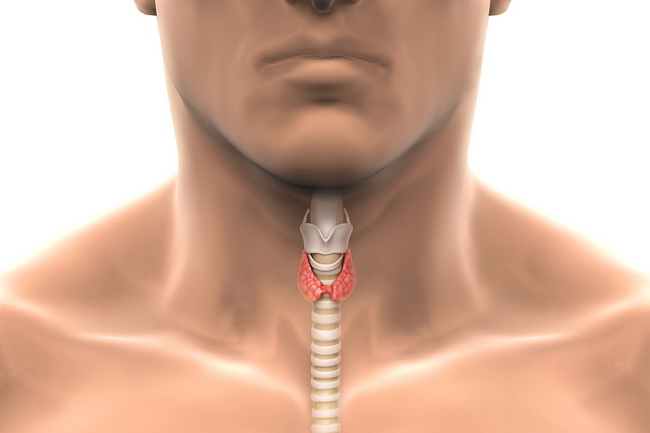- Make It Yourself Lavender Heart-Shaped Bath Bombs!
- 20 Things You Never Knew About “Down There”
- 12 Best Foods For Those Suffering From Arthritis Pain
- 12 Personal Hygiene Mistakes Almost Everyone Makes (Mom Never Told You About #4!)
- 15 Medicinal Plants And Herbs From The Cherokee People
- 12 Mind-Blowing Benefits Of Drinking Coconut Water During Pregnancy
- 12 Outstanding Winter Foods That Won’t Fatten You Up Like A Christmas Turkey
15 Signs You Are Having Thyroid Problems (#9 is Really Surprising!)

Photo credit: bigstock.com
Every human being has a thyroid gland: a small, butterfly-shaped gland right near the center of the neck. It might be small, but it is certainly powerful.
Many people consider the thyroid the “king” gland when it comes to metabolism and making hormones. Your thyroid controls the function of so many of our vital organs, including the kidneys, liver, heart, skin, and brain. When the thyroid does not function properly, our bodies can suffer tremendously.
Thyroid problems are more common than you might think, and they can cause many physical, emotional, and hormonal changes in the body. It’s thought that perhaps 59 million Americans suffer from some type of thyroid problem, but perhaps half that many are not even aware that they have a problem.
The American Association of Clinical Endocrinologists state that millions of people suffer with thyroid problems because most of the symptoms go unnoticed or perhaps even misdiagnosed.
Although symptoms can vary from person to person and not every symptom means that you have a thyroid problem, if you have been suffering from certain health problems and your doctor has yet to discover what the underlying cause is, you might want to consider asking your physician to test your thyroid.
Take a look at the top 15 symptoms of thyroid dysfunction and talk to the doctor about which ones are affecting you.
1. You Have Fuzzy Brain
You might chalk this up to a lack of sleep or to your age, or maybe even stress overload, but when your thyroid is out of whack, your brain takes a big hit as well. Hyperthyroidism (when your thyroid puts out too many hormones) can cause problems with concentration, and hypothyroidism (of course, when your thyroid does not put out enough hormones) can result in a general brain fog and periods of forgetfulness. When patients are treated for their thyroid problems they are often shocked at clearly they can think again. Ladies, if you think your brain fog is a symptom of menopause, ask your doctor if it could be your thyroid.
2. You Are Always Tired
Although fatigue is a symptom of many different health problems, it is also common for those with thyroid issues.
Some people find that they don’t have the energy to go all day without taking a nap. Still others find that they can’t sleep well at night, so they are exhausted during the day. If you find that you are constantly tired and feel that you have tried everything to resolve it but that nothing works, ask your doctor for a thyroid test.
3. Your Taste Buds Went South
If everything suddenly seems to smell strange or taste strange, it might be your thyroid. This can affect your appetite, causing you to lose weight without trying. You might think that many things smell like rotting oranges or nuts, none of which is pleasant. If any of these things sound familiar to you, see your doctor to confirm the diagnosis.
Continue to Page 2

Photo credit: bigstock.com
4. You are Depressed or Anxious
If you are feeling depressed, anxious, or if you have frequent panic attacks and you have not responded to typical medications or other types of herbal treatments, this is a good indication that you have a thyroid problem.
Depression can be due to hypothyroidism, while many doctors find that those suffering from panic attacks or high levels of anxiety are often caused by hyperthyroidism.
When the thyroid function fails to produce enough serotonin in the brain, they can have feelings of depression as well as panic attacks or feelings of intense anxiety. Although these feelings alone are not enough to indicate a malfunctioning thyroid, you should still discuss this with your doctor when all other methods have failed.
YOU MIGHT ALSO LIKE: 11 Dangerous Toxins that are Harming Your Thyroid
5. You Have Muscle or Joint Pain
An underactive thyroid can cause muscle weakness and pain, cramping and stiffness. It can be a contributing factor to tendonitis, carpal tunnel, joint pain, and tarsal tunnel syndrome. All of the above can be due to hypothyroidism.
However, if you are experiencing feelings of fatigue and muscle weakness, so much so that you find it difficult to climb stairs, keep your arms over your head for more than a few seconds, or hold anything in your and for very long, you might have a problem with hyperthyroidism.
6. You Are Gaining or Losing Weight
Anytime you begin to lose or gain weight and you cannot find a reason for this, and if you have tried strict diets and rigorous exercise programs but still gain weight, you could be a thyroid problem. In fact, this is the number one reason women in particular see their doctor about their thyroid is their inability to lose weight.
However, losing weight can also be a sign of a malfunctioning thyroid. When your thyroid produces more hormones than the body needs, you can lose your appetite, and even if you try to eat more, you can still lose weight. Although most people wouldn’t think of this as a problem, you can become too thin and even malnourished.
Any unexplained weight change should be checked out by a doctor to rule out thyroid dysfunction or any other serious health problem.
Continue to Page 3

Photo credit: bigstock.com
7. You Have Menstrual Problems
Most women with thyroid dysfunction have numerous menstrual problems. Thyroid dysfunction can cause delayed or early puberty or menstruation. In fact, any change in your menstrual cycle or if your periods become irregular, this could be a sign of a thyroid issue.
Hypothyroidism often causes prolonged, painful, and more frequent periods. Hyperthyroidism leads to the opposite, of course. Many infertility problems are also linked to thyroid problems.
Changes in your menstrual cycle can be a symptom of an underlying thyroid condition. If your daughter has very early or delayed menstruation, she could have a thyroid problem as well. Consult with your gynecologist to determine if there is a problem.
8. You Have Super Dry Skin
Even your skin moisture is controlled by your thyroid gland. When hormone levels are low, your skin will become dry and pale in color. Hypothyroidism causes edema, scaly looking skin, wrinkled skin, and very little sweating. An over-active thyroid can cause skin to become itchy, sweaty, red, and sometimes very warm to the touch, although there is no fever.
9. You Have No Interest in Sex
If you find that you have little or no interest in sex, maybe that extra shift of overtime is not to blame. An underactive thyroid puts out very few hormones, and it’s hormones that put you in the mood. Of course, it could also be that other factors related to hypothyroidism, weight gain, body aches, fatigue, could be the reason you would rather watch old Bonanza reruns rather than jump in the sack with your spouse, could also play a part. If sex just isn’t your scene suddenly and you really don’t understand why, check with your doctor.
Continue to Page 4

Photo credit: bigstock.com
10. Your Bowels are Out of Order
Some people believe that they have IBS or some other type of digestive problem, when what they actually have is a thyroid disorder. Thyroid hormones can change your bowel habits, interrupting your body’s ability to both digest food and remove waste.
If you have problems such as constipation, diarrhea, excessive gas, and bloating and your gastroenterologist has not been able to pinpoint a problem, talk to them about a possible thyroid malfunction.
11. You Are Losing Your Hair
An unexplained loss of hair, including eyebrows and other body parts, is often associated with thyroid issues. Your hair might become thin, brittle or dry. Your scalp might become dry or itchy. An unexplained loss of hair is almost certainly a thyroid problem, so consult with your doctor and get back your beautiful mane.
12. You Are Losing Your Voice
Problems with the thyroid can cause voice problems as well including sounding hoarse, or as if you have laryngitis. You might snore or suddenly lose your voice when speaking. All of these problems with your voice can indicate a thyroid problem.
Continue to Page 5

Photo credit: bigstock.com
13. You Literally Have a Pain in the Neck
Since the thyroid gland is located in the front of the neck, any discomfort, protrusion, slight bulge, or swelling in the neck area might be an inflamed thyroid, or possibly a goiter, which is when the gland swells or becomes abnormally enlarged. Goiters can be caused by either hyperthyroidism or hypothyroidism. Any discomfort in the neck, or any type of swelling should be checked out by your doctor as soon as possible.
14. You Are Hot – Except When You Are Cold
This is a classic symptom of a thyroid dysfunction. Changes in the level of thyroid function interrupt the body’s ability to regulate your body temperature. Cold hands and feet, or just feeling cold nearly all the time, even when in a warm room, is often due to hypothyroidism. On the other hand, if you are hot even when the fan is blowing on you, or if you find you are constantly sweating and find that you cannot tolerate any heat, you might have hyperthyroidism.
SEE ALSO: 14 Best Herbs for Thyroid Problems and Support for Healthy Thyroids
15. You Are All Aflutter
If you feel a fluttering in your chest (and you haven’t fallen in love recently) those are probably heart palpitation. When your heart is fluttering, beating really hard, racing, or feeling as if it skips a beat or two, this can be a sign of too many thyroid hormones in your body.
Of course heart palpitations can be caused by many, many things, but thyroid problems can also be a cause. If your doctor has ruled out other problems, ask them if your problem could be your thyroid.
Some doctors are resistant to a diagnosis of a thyroid, but if this happens, find a doctor who is willing to listen to you and consider other options.
References:
































